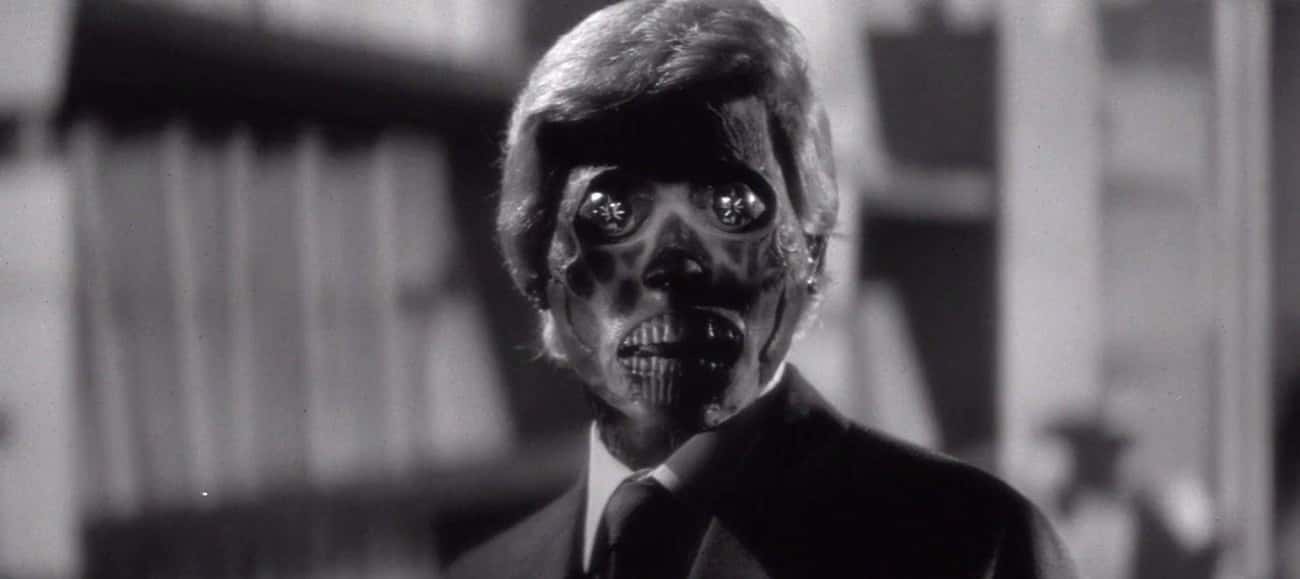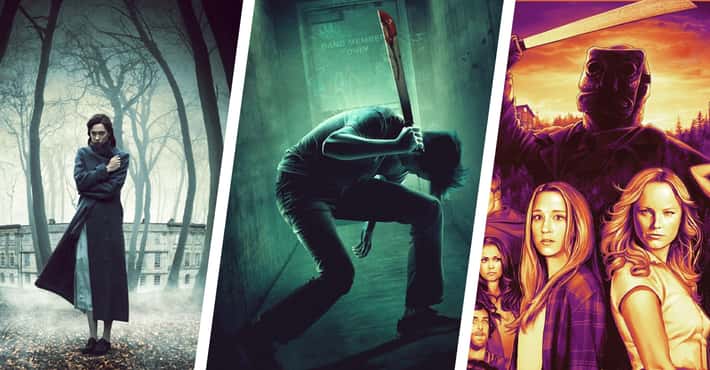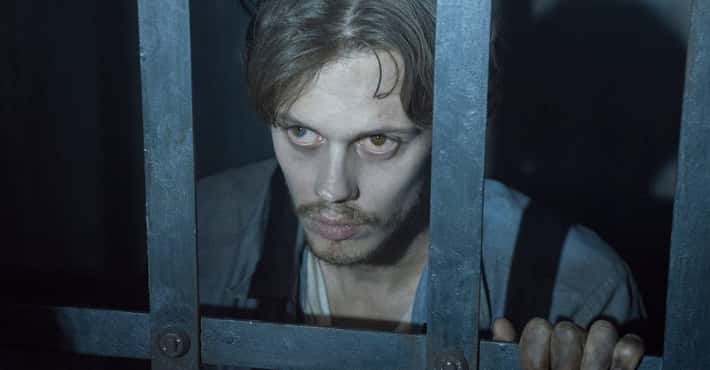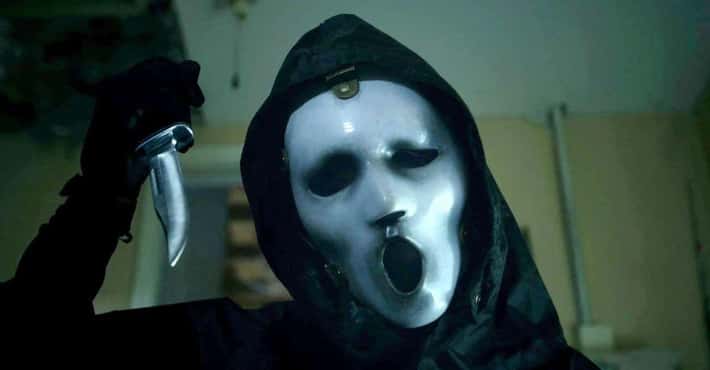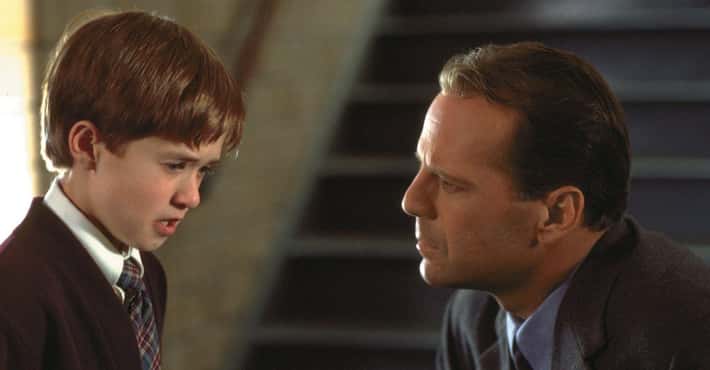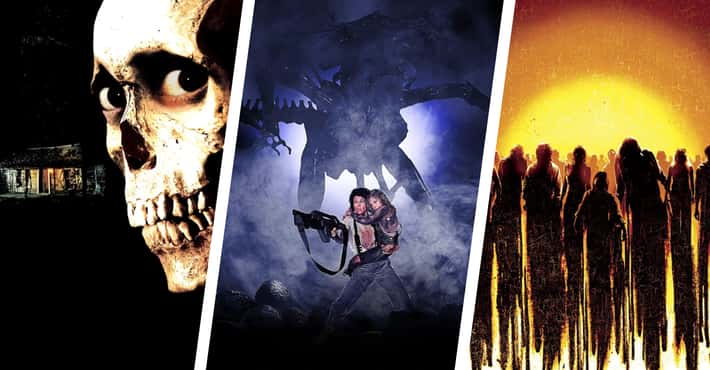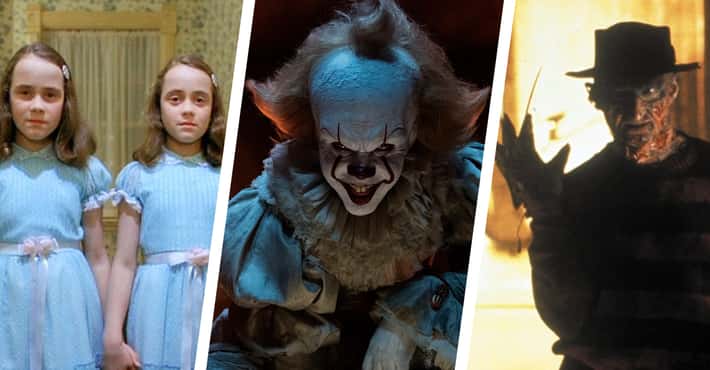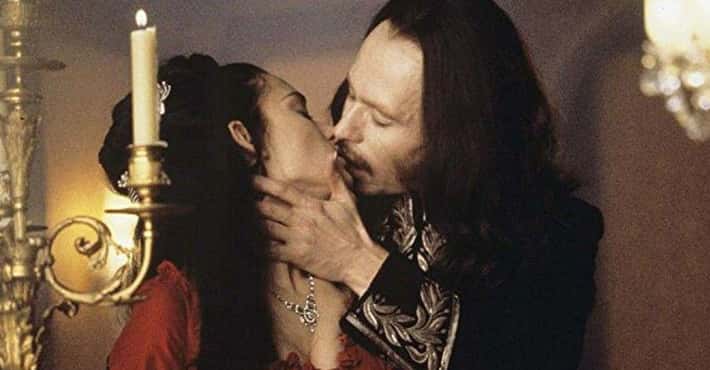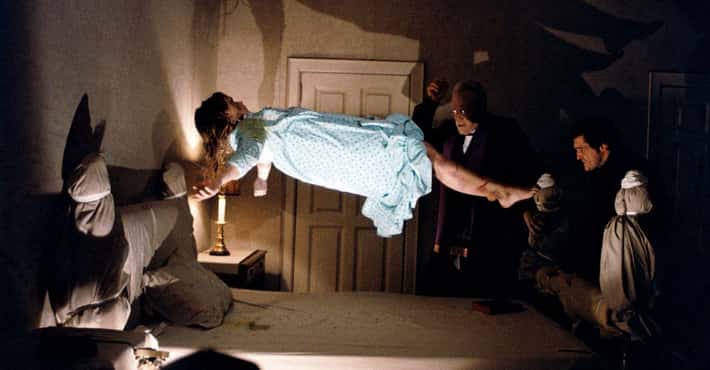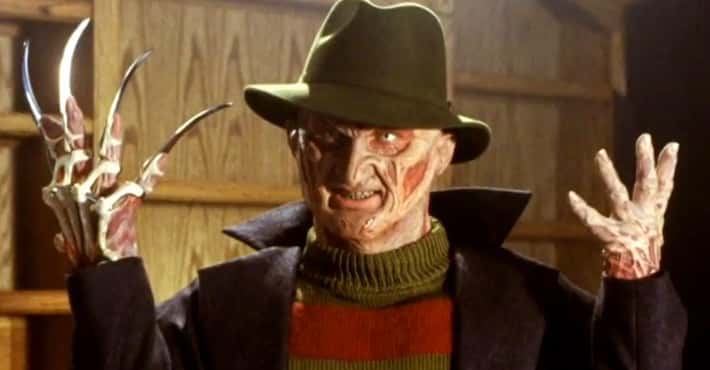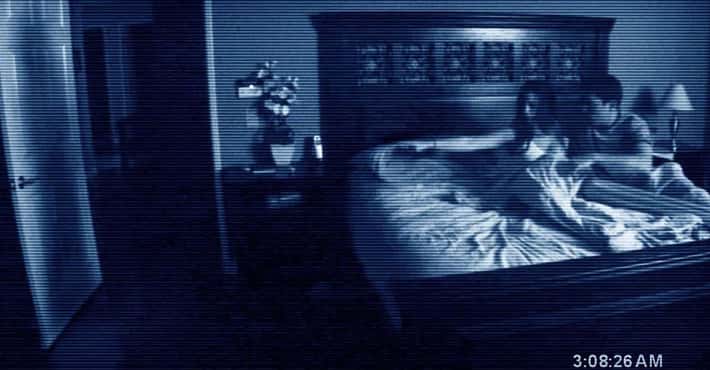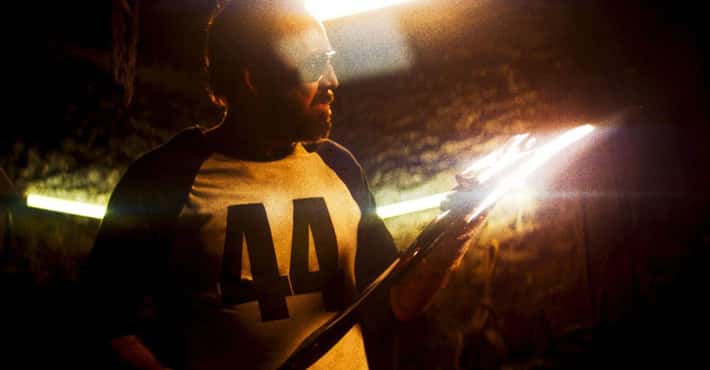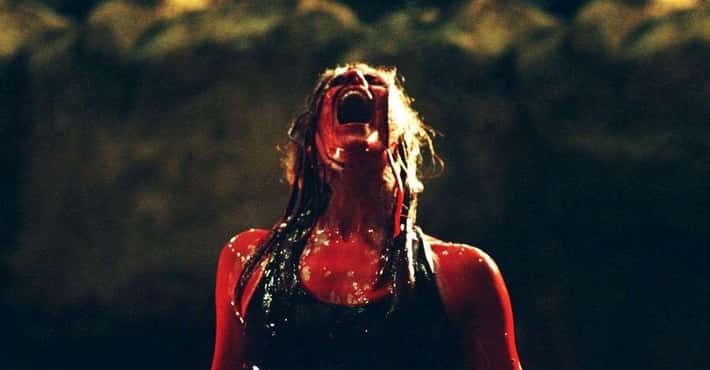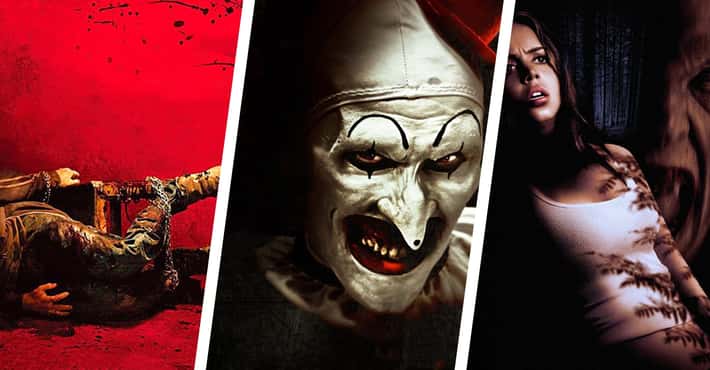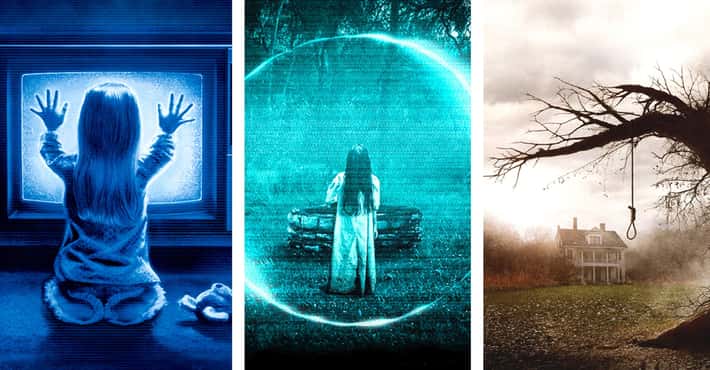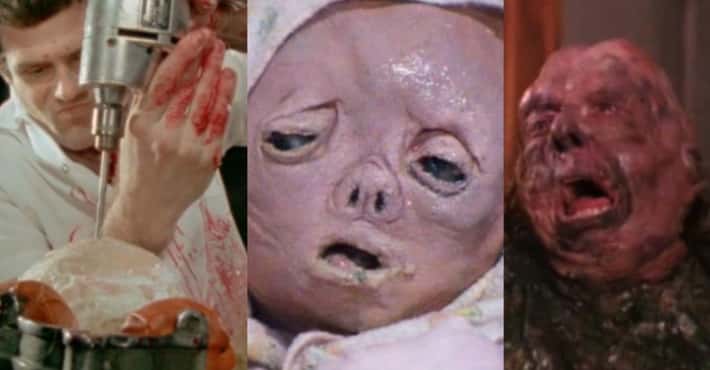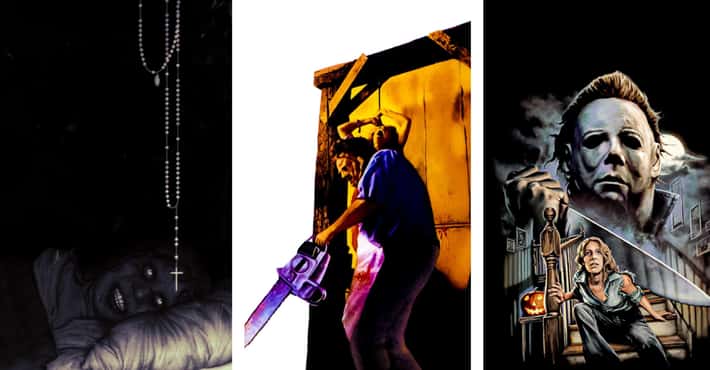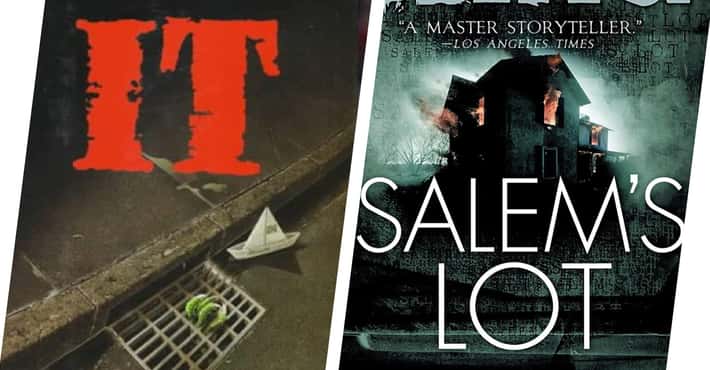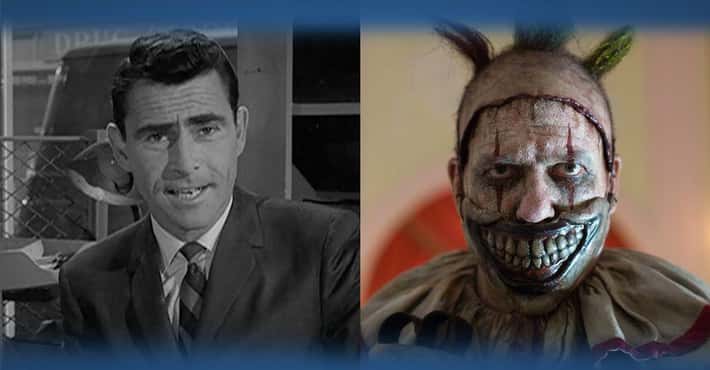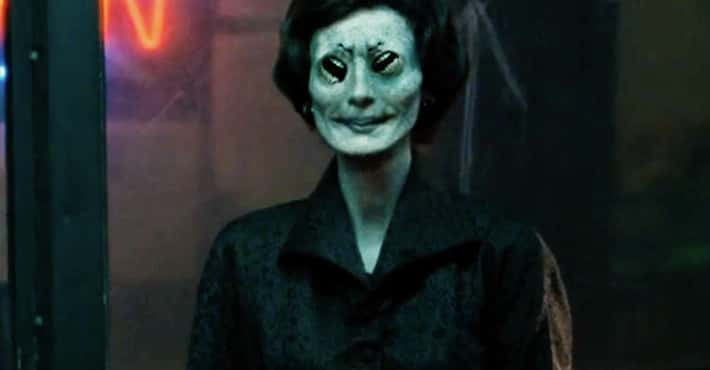
- Photo:
- Velvet Buzzsaw
- Netflix
14 Horror Movies Where Rich People Are The Villains
- 1117 VOTES
Mommy (Wendy Robie) and Daddy (Everett McGill) live in a home in the midst of an impoverished neighborhood, hoarding their wealth and capturing the children of less fortunate families and keeping them in their house of demented rules. If the children call out for help, they reap the punishment of breaking the rule "speak no evil" - a tongue cut out. The product of inbreeding and wealth borne of price gouging in the funeral business and then real estate, Mommy and Daddy use their wealth to keep up appearances while hunting the poor around them.
Director Wes Craven's commentary on the 2015 Blu-Ray release of the film suggests that "the whole society of the United States” is represented by the home of Mommy and Daddy, which reinforces the idea that wealth is locked away from the struggling poor and hoarded by those already flush with abundant money.
- 2106 VOTES
The government is the rich villain in this film, creating a day where all residents of the United States can commit transgressions with immunity from prosecution during and after the event. While the entire idea of the Purge is based on allowing everyone to release their pent-up aggressions for one day in an effort to minimize mayhem the rest of the year, the real objective is to eliminate the "less desirable" members of society: the poor and disenfranchised.
As the first movie opens, the Sandin family and their rich neighborhood prepare for the 12-hour Purge by arming their expensive security systems and remaining locked inside their vast mansions to avoid the chaos going on outside their door. The reality of the event lands on the Sandins' doorstep when their son allows a young African American man chased by privileged white Purgers into the home. The subsequent films in the series all delve further into the reality that poor minorities spend the evening either perishing, attempting petty transgressions to help their families, or hiding in community buildings with insufficient ways to keep the incursion at bay.
Meanwhile, the rich government stands by and watches to ensure their end goal of eradicating the poor is ultimately met.
More The Purge- #79 of 397 onThe Best Horror Movies Of All Time
- #32 of 108 onThe Best Intelligent Horror Movies
- #7 of 54 onThe Most Horrifying Home Invasion Movies
- 368 VOTES
The classic Edgar Allan Poe story is obvious in its portrayal of the rich and privileged as villains, and that continues in the 1964 film starring Vincent Price as Prince Prospero. When a deadly plague infects a village, Prospero burns it down and retreats into his heavily fortified castle to feast and celebrate with other nobles as the poor perish in agony.
In another case of the elite refusing to see others as on the same social or human level as themselves, Prospero forces prisoners to fight to the end before releasing one to the burned village to succumb to the Red Death. He also forces his soldiers to slay villagers seeking asylum from the Red Death, sealing his own fate in the blood of others. When the Red Death infiltrates the grotesque party of Prospero, it becomes clear that the Prince created his own hell and grim fate in his cruel treatment of the poor.
- 476 VOTES
While the antagonists are not as wealthy as some other movie villains, money is their driving force. The Davisons gather in their rural vacation home to celebrate their parents' wedding anniversary and bring the estranged family and siblings back together. During dinner, a man in an animal mask shoots an arrow through the face of Aimee's (Amy Seimetz) boyfriend, Tariq (Ti West), beginning a night of terror and home invasion.
As the film goes on and the assailants reveal themselves to be a group of three hired men, the viewers see that greed is the driving factor in a plan hatched by two of the siblings to dispatch their rich parents and third sibling in order to inherit all of the money. The thought of being given money allows those siblings to forget about their loved ones as actual people and treat them as obstacles to be overcome. The societal and economic pull of never worrying about bills again appears to outweigh the heinous plan and acts themselves, allowing the villains to rationalize slayings in their pursuit of the American Dream.
More You're Next- #220 of 397 onThe Best Horror Movies Of All Time
- #10 of 20 onHorror Movies That Originally Had Much Darker Endings
- #3 of 54 onThe Most Horrifying Home Invasion Movies
- 577 VOTES
Man is the most dangerous game and the rich are inclined to pay for the opportunity to hunt him. Hostel paints a picture of depraved and deeply bored rich people willing to pay top dollar to antagonize and eventually execute captured visitors in a seemingly lawless Slovakia. Business is business to the people who snatch up unwilling participants, and people aren't human beings but conquests to those who spend endless funds to slay them.
The rich are morally absent children with their eye on the latest and most thrill-inducing experience, giving no thought to the consequences of their actions or their targets' life outside of their own needs. Social status and what money can buy is the only measure of a human in the eyes of the clientele, with no qualms about pursuing their wants in the face of ending another person's pursuits. Even human life is a commodity to be bought and sold when someone has more money than humanity.
More Hostel- #9 of 125 onThe 100+ Grossest Movies Ever
- #104 of 397 onThe Best Horror Movies Of All Time
- #79 of 143 onThe Best Movies of 2005
- 635 VOTES
Alex (Lanah Pelley) works as a waiter in a restaurant where patrons dine on exotic and endangered species while treating their low-wage servants as garbage. After having enough of the cruel treatment, Alex forms an anarchist group set on bringing down the government. Not only are the restaurant's clientele seen as monsters, but the government is full of prejudiced, classist, and rich villains plotting ways to keep the citizens overwhelmed and compliant.
A Commander Fortune (Ronald Allen) harnesses the anarchists to further his own plans to derail a politician who holds the favor of the people, Home Secretary Nosher Powell (Nosher Powell). Fortune has double agents and controls foreign adversaries behind the scenes while Alex and the crew dispatch the clients of his former restaurant job.
The portrayal of the rich antagonists is meant to embody the reign of Margaret Thatcher, a reviled prime minister who catered to the affluent while ignoring the poor. Don't miss the cameo by Paul and Linda McCartney.
- 785 VOTES
Helen Lyle (Virginia Madsen) is a graduate student who enjoys a life of luxury and privilege with her professor husband in their gorgeous loft, spending evenings drinking wine and dining with colleagues. In her fervor to outshine and outmaneuver older male colleagues, Lyle's study of urban legends for her thesis focuses on the people living in the Cabrini-Green public housing project to further her work.
In an effort to study the phenomena of the Candyman, Lyle forces her way into the housing project, sneaks into off-limit areas, and puts the life of a young mother and her son in danger in her pursuit of thesis material. While ultimately punished with the fate of doom and an eternity of wreaking vengeance whenever summoned via mirror, Lyle's actions disrupt an entire neighborhood of struggling and socioeconomically forgotten people who must endure the police presence and malevolent force she awakens without regard for others. The lives and welfare of these people are never the focus of Lyle, no matter how hard she attempts to convince herself that is the case.
- 874 VOTES
Money is the root of all evil in this 1988 movie where aliens strike a deal with the already rich and powerful American government into allowing them to take over the planet. Director John Carpenter confirmed the film's themes to Starlog Magazine in a 1988 interview:
The picture's premise is that the "Reagan Revolution" is run by aliens from another galaxy. Free enterprisers from outer space have taken over the world, and are exploiting Earth as if it's a third world planet. As soon as they exhaust all our resources, they'll move on to another world... I began watching TV again. I quickly realized that everything we see is designed to sell us something... It's all about wanting us to buy something. The only thing they want to do is take our money... [Reality through the sunglasses] is seen in black and white. It's as if the aliens have colorized us... The creatures are corrupting us, so they, themselves, are corruptions of human beings.
More They Live- #162 of 399 onThe Best Movies Of The 1980s, Ranked
- #40 of 166 onThe 150+ Best Futuristic Dystopian Movies
- #40 of 178 onThe Best Alien Movies Of All Time, Ranked
- 955 VOTES
Society
- Photo:
Bill Whitney's (Billy Warlock) family is rich and eccentric, leading him to distrust them. As it turns out, his family is actually a different species that engages in strange rituals where the creatures melt and merge together to exhume nutrients from targets.
The film uses the different species of the antagonists as an allegory for the way the rich often act as though they are a fully different animal than the poor, creating a satire marking the rich as evil entities willing to suck dry anyone that gets in their way. Not only can they end someone financially, but they can take a life without repercussions impacting their lifestyles or lowering their numbers.
More Society - 1067 VOTES
The Kim family garners a connection to the wealthy Park family through a friend of their son who also provides them a scholars rock meant to bring monetary prosperity to them. This friend, Min-hyuk (Park Seo-joon), pushes Ki-woo Kim (Choi Woo-shik) to pretend to be the new English tutor for the Parks' daughter, and Ki-woo ends up ingratiating himself within the wealthy family. The Kim family uses this opportunity to push out all of the other Park home employees in an effort to live a life of luxury they covet.
In their pursuit of that wealth, the Kim family inadvertently slays a former employee of the Park family and sees their true relationship to the rich family - as that of employees only and not friends or even people. This spurs more carnage and a truly sad ending for everyone involved, with the pursuit of wealth changing the poor Kims and the ownership of said wealth, making the Parks look down on the poor.
More Parasite- #108 of 252 onThe 200+ Best Psychological Thrillers Of All Time
- #26 of 96 onThe Very Best Oscar-Winning Movies For Best Picture
- #5 of 425 onThe Greatest Movies in World Cinema History
- 1138 VOTES
Josephina (Zawe Ashton) snatches the paintings of a late artist named Vetril Dease (Alan Mandell) and allows her colleagues in the art world to take multiple pieces of the ill-gotten art. As the various art critics, gallery owners, and curators take advantage of Dease's artwork to build their own reputations, the paintings begin to seek revenge for their creator.
Not only do the rich characters in this film completely disregard any family member of Dease, their pursuit for self-gratification and money leads them to commit a heinous transgression against a deceased man with no second thoughts. The artist is seen as a means to an end, and the art a reason to disregard him. The world of art and its self-involved displays of faux intellectualism and critiques of media where the meaning changes from person to person becomes a society all its own in this film. The members of that society act out and ignore anything unrelated to the self, the pomposity, and the money of their trade.
More Velvet Buzzsaw- #87 of 108 onThe Best Intelligent Horror Movies
- #8 of 8 onThe Best Toni Collette Horror Movies Of All Time
- #13 of 17 onHorror Movies About Artists And The Art World
- 1245 VOTES
While the aliens invading the Earth to prepare it for their new home are the main villains, Dr. David Kibner (Leonard Nimoy) is not blameless. The celebrity psychiatrist and author uses his clout and name recognition to ease the minds of panicked people while allowing the aliens to do away with people before taking their place as copies grown from pods. As more and more characters approach Kibner with proof that unemotional aliens have taken over their loved ones, he uses his expertise to talk them down.
When Kibner reveals himself to be an alien, the subterfuge is revealed as part of the plan for the incursion. The actions of the character mimic the indifference to people outside a certain subset of society deemed to be more worthy than another, perhaps the very wealthy to the very poor. While the truth or choice to invade is allowed for the ruling class, those about to be conquered must fall in line by the use of lies or force.
- #12 of 64 onThe Best Horror Movie Remakes Of All Time
- #52 of 178 onThe Best Alien Movies Of All Time, Ranked
- #77 of 397 onThe Best Horror Movies Of All Time
- 1353 VOTES
It isn't the well-off nature of the Wilson family that creates a villain in this film. It's the rich government that created clones of the population in a bid to control citizens that is the real antagonist in this twisting story. Red's (Lupita Nyong'o) plans to bring the Tethered to the surface and claim their place in the sun isn't possible without the government's failed experiment spurring the narrative into motion.
In an attempt to push the citizens into conformity and blind allegience, the Tethered clones populate a series of unused underground tunnels. The idea to control the Tethered to force the mirrored actions in the population fails to work, instead flipping the mirroring to bind those underground to the actions of those above. One unplanned meeting between two connected souls brings about carnage and disaster on an epic scale as the flawed plans of the social elite bring about their own destruction in the pursuit of unbridled control and wealth.
More Us- Dig Deeper...All The Horror Inspirations And Easter Eggs Hidden Throughout 'Us'
- And Deeper...Compelling 'Us' Fan Theories
- #175 of 397 onThe Best Horror Movies Of All Time
- 1431 VOTES
A wealthy family is thrown into turmoil when Richard (Dermot Mulroney), father to India (Mia Wasikowska) and husband to Evelyn (Nicole Kidman), perishes in a collision. During the funeral, Richard's long-lost brother, Charlie (Matthew Goode), appears to insert himself into the life of his sister-in-law and niece. Although money is not implicitly indicated as a driving force for Charlie's inhumane behavior, having access to money is the thing that allows him to set the events of the movie into motion.
Charlie buried his younger brother Jonathan alive as a child out of jealousy for Richard's interest in the sibling. After leaving an asylum and sending letters displaying an alarming obsession with India, Richard gifts Charlie with money and a car to stay away from his daughter. That money and vehicle allows Charlie to fabricate a history of traveling the world, appearing as one would expect and having the things associated with money.
The movie also illustrates that money cannot change a distorted mind, but it can fund the horrific thoughts it produces.
More Stoker









